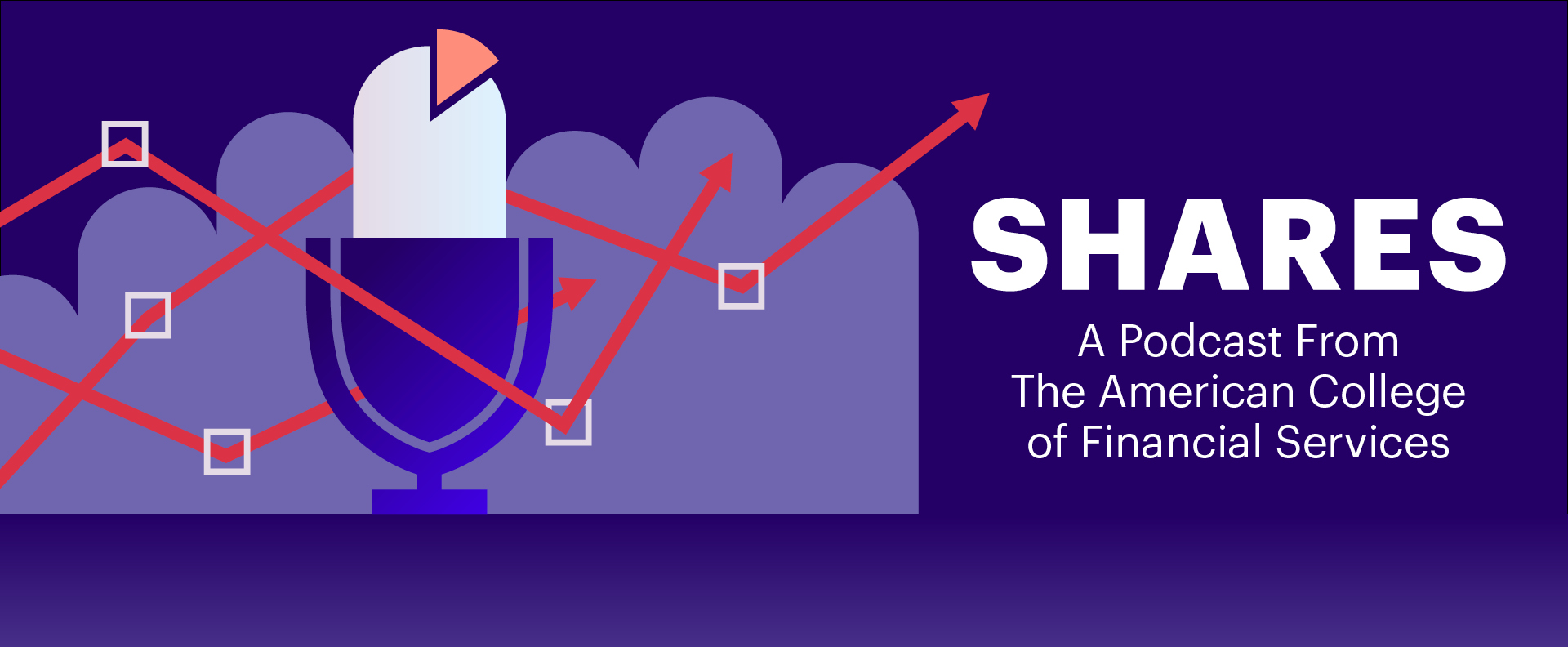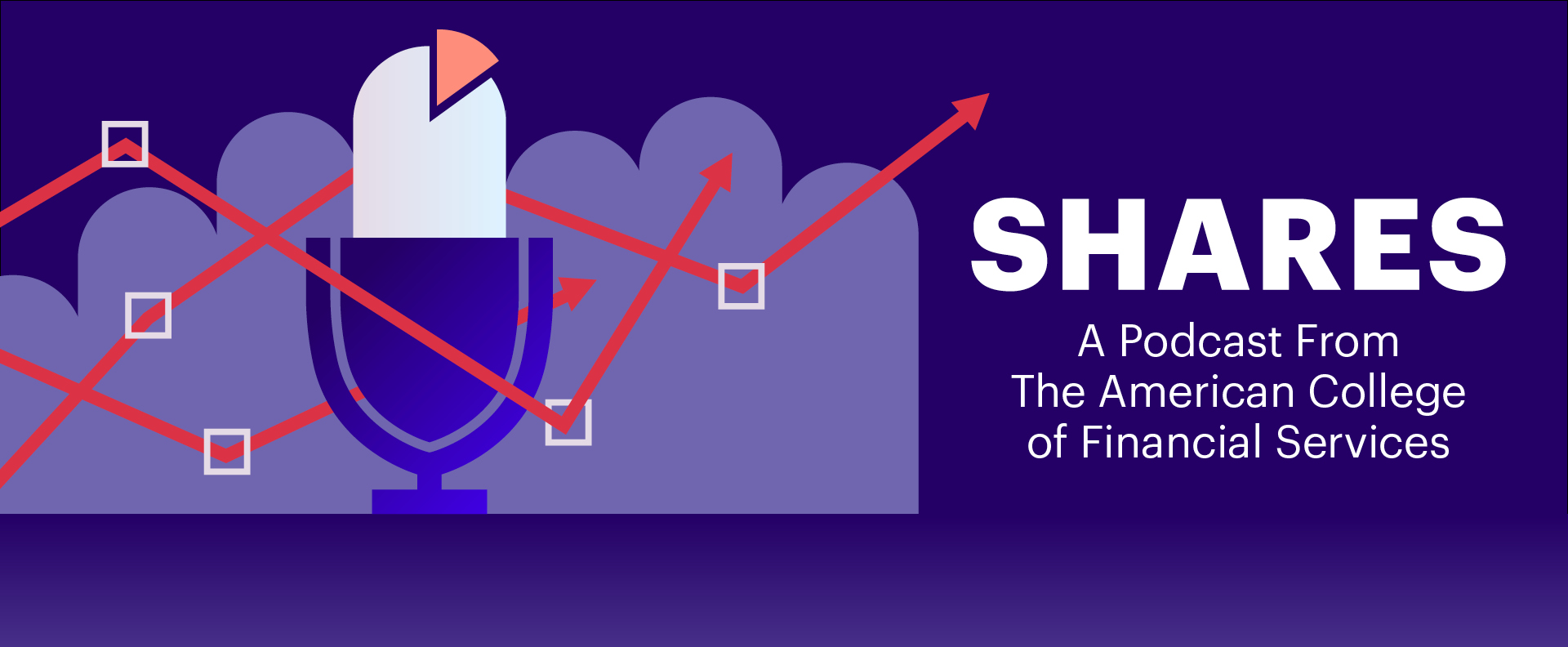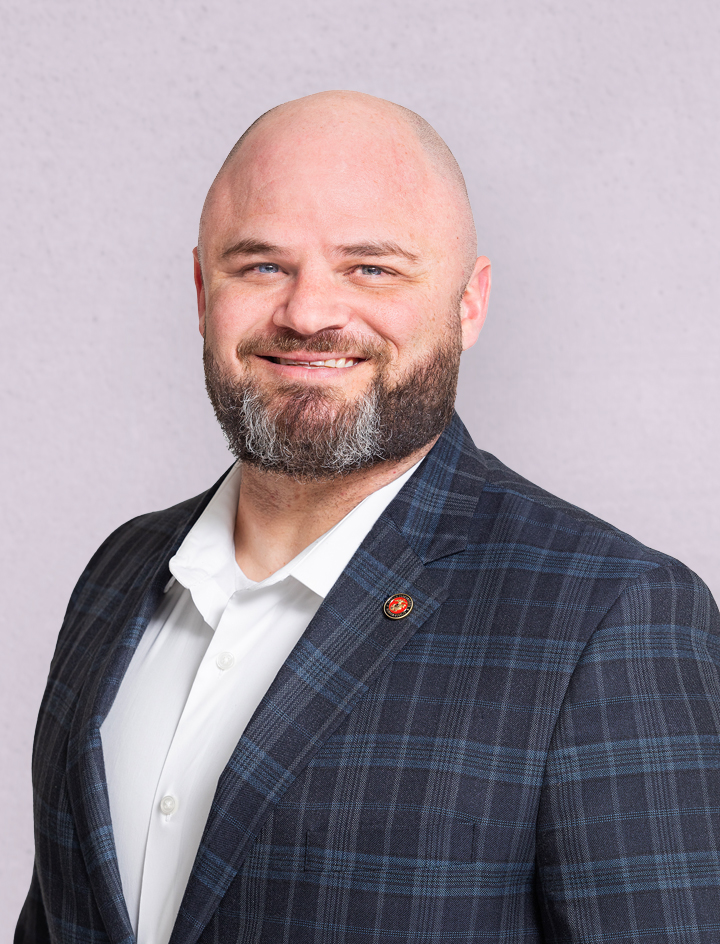Building Client Connections for Retirement Planning Success

Research including The College’s own 2023 Retirement Income Literacy Study suggests troubling knowledge gaps in the average American’s understanding of retirement planning, with 74% of consumers ages 50 to 75 failing a test of basic retirement knowledge. Another industry survey, the 2023 National Retirement Risk Index, predicts 51% of today’s working-age households will be unable to maintain their pre-retirement lifestyle once they leave the workforce.
To meet this moment, The College has named focusing on retirement as one of our 2024 strategic priorities: ultimately, to become the industry’s leading source of knowledge on retirement planning. There are many opportunities to do so, according to Sandy Herzlich, vice president of retirement strategy – but first, one has to challenge the notion that simply having a large nest egg is the solution.
“There are different levels of satisfaction in retirement, and different goals depending on the person,” he says. “Retiring with a lot of money alone isn’t a recipe for success. Because of this, retirement planning is going to be a much more relationship-driven business moving forward. Advisors need all the expertise, but they also need to couple that with layering in more personal aspects: understanding what their clients’ goals are and what potential roadblocks could stand in their way. They’re not just a financial manager; they’re a true partner.”
That understanding is critical to this time and place, according to Eric Ludwig, PhD, CFP®, our Retirement Income Certified Professional® (RICP®) Program director. He cites the common industry consensus that the Baby Boomer retirement wave is cresting in 2024, with roughly 12,000 Americans turning 65 every day.
“The number of Boomers retiring has been growing every year as that generation ages out of the workforce, but this year, more of them will be entering retirement than ever before or likely ever will again,” Ludwig says. “People are living longer than programs like Social Security were ever intended for, and it’s stretching resources all over the place.”
Because of this, Ludwig agrees that the psychology of retirement planning is a subject of paramount importance, and one he plans to incorporate even more into the RICP® Program curriculum over time.
“As human beings, our minds are not well-adapted to deal with uncertainty, and with all the options available and changes going on today, so much of retirement planning is fundamentally uncertain,” he says. “Advisors may think they can address these concerns with spreadsheets and calculations, but once you get started, you realize it’s more about relationships and trust than anything.”
Ludwig’s and Herzlich’s assertions follow the numbers: in The College’s 2023 Retirement Income Literacy Study, researchers found a clear correlation between lower client anxiety about retirement planning and the presence of a qualified, competent advisor. In all, nearly 11 points could be added to a respondent’s retirement knowledge score if they had working relationship with an advisor – data Ludwig calls evidence of a “significant positive benefit.”
Read the full article and learn more about The College’s impact on the retirement planning field today, as well as new initiatives in the works to address this growing need, in our 2023-2024 President’s Report.
Author
Subscribe to Newsletter
Related Posts
Key Insights for Informed Retirement Decisions
Shares: Actualizing a Dream

In this episode of our Shares podcast, host Eric Ludwig, PhD, CFP® is joined by his own martial arts instructor, small business owner, and actor Mike Moh – perhaps best known for his turn as legendary actor and martial artist Bruce Lee in Quentin Tarantino’s 2019 film Once Upon a Time in Hollywood. Moh details the challenges and triumphs of pursuing his acting goals and building a business based on community, as well as what financial professionals can take away from his journey to apply to their own career endeavors.
Mike Moh is an actor and the founder of LVLUP Martial Arts in Waunakee, WI. Mike grew up in St. Paul, MN. He was inspired by one of his heroes, Jackie Chan, while working as a stuntman in Hong Kong on the film “Robin-B-Hood” to pursue a career in acting. He relocated to Los Angeles and landed roles in numerous commercials, TV shows, and films like
“Street Fighter: Assassin's Fist,” widely considered the best film adaptation of a video game. After nearly a decade in LA, he relocated his family back to the Midwest in 2013 to open his own martial arts studio while still booking roles on prime-time shows like FOX's “Empire” and ABC's “Marvel's Inhumans.” Moh continues his martial arts training daily and holds the rank of 6th Degree Black Belt in Songahm Taekwondo. In November 2022, he was bestowed the title of Master Instructor.
Any views or opinions expressed in this podcast are the hosts’ and guests' own and do not necessarily represent those of The American College of Financial Services.
Shares: Dave Ramsey’s Bad Math

To assess the validity of Ramsey’s claims, our host Michael Finke, PhD, CFP® assembled The College’s resident retirement supernerds – adjunct professor of wealth management David Blanchett, PhD, MSFS, CFA, CLU®, ChFC®, CFP® and professor of practice Wade Pfau, PhD, CFA, RICP® – to discuss their printed response to Ramsey, optimal withdrawal rates, sequence of returns risk, and best-practice retirement planning in the inaugural episode of our Shares podcast.
Wade D. Pfau, PhD, CFA, RICP® is a professor of practice in the Retirement Income Certified Professional® (RICP®) Program at The American College of Financial Services. Pfau serves as a co-editor of the Journal of Personal Finance and is a sought-after speaker at national conferences of organizations for financial professionals, such as the CFA Institute, FPA, NAPFA, AICPA-PFP, and AFS. He also consistently publishes articles in a wide variety of academic and practitioner research journals. He hosts the Retirement Researcher blog and is a monthly columnist for Advisor Perspectives, a RetireMentor for MarketWatch, a contributor to Forbes, and an expert panelist for The Wall Street Journal. His research has been discussed in outlets that include print editions of The Economist, The New York Times, The Wall Street Journal, and Money Magazine.
David Blanchett, PhD, MSFS, CFA, CLU®, CHFC®, CFP® is an adjunct professor of wealth management at The American College of Financial Services. A world-renowned thought leader in the fields of wealth management and retirement, Blanchett is a leading contributor to the Wealth Management Certified Professional® (WMCP®) program. In addition to his role with The College, Blanchett is the managing director and head of retirement research at QMA, a division of Prudential Financial, and was formerly at Morningstar Investment Management, LLC. In his roles, Blanchett enhances consulting and investment services and conducts research primarily in the areas of financial planning, tax planning, annuities, and retirement. Blanchett has published research in a variety of academic and industry journals and has been featured in multiple media publications, such as InvestmentNews, Marketwatch, Money Magazine, The New York Times, PLANSPONSOR Magazine, and The Wall Street Journal.
Any views or opinions expressed in this podcast are the hosts’ and guests' own and do not necessarily represent those of The American College of Financial Services.
Unveiling Results from the Retirement Income Literacy Study

The study, which is the fourth iteration of The College's Retirement Income Literacy Study, reveals concerning gaps in retirement knowledge among older Americans. On average, participants scored only 31% on a retirement literacy quiz, highlighting a lack of actionable retirement knowledge.
Dr. Kaylee Ranck, Director of College Research, led the efforts to launch this project on behalf of the American College Center for Women in Financial Services and presented the findings at the event. The study underscores the direct relationship between financial literacy and factors such as asset levels. Respondents with assets exceeding $1.5 million scored twice as high as those with less than $100,000 (50% vs. 25%), indicating that wealthier individuals tend to have a better understanding of retirement planning.
The study also emphasizes the crucial role of financial professionals in educating clients. Advised respondents, those who work with financial advisors, demonstrated higher retirement income literacy and better outcomes compared to their non-advised peers. This finding highlights the importance of professional guidance in navigating the complexities of retirement planning.
The timing of the study is particularly relevant as the United States approaches a demographic shift known as the "Graying of America." The Baby Boomer generation is reaching retirement age, with an estimated 12,000 individuals retiring every day. As the median age of Americans increases, planning for longer, well-lived lives become increasingly important.
The media event in New York City, attended by journalists from leading trade publications and industry experts, served as a platform to disseminate these findings. The Retirement Income Literacy Study not only sheds light on the current state of retirement literacy, but also points to the need for a concerted effort to improve financial education and planning.
In addition to the broader findings, the Center for Women in Financial Services is set to launch a specialized segment of the data focusing on retirement income planning for women. This initiative aims to highlight the distinct outcomes and knowledge levels of women regarding retirement income. The continued examination of the survey results, including this targeted analysis, is essential in providing valuable insights into the state of retirement planning and financial literacy in the United States. As the research progresses, it will remain instrumental in shaping the conversation around retirement readiness and financial education, with a particular emphasis on addressing the needs of diverse demographics.
Hear What Experts Say About the New Retirement Income Literacy Study

The American College of Financial Services released the findings of the fourth wave of the Retirement Income Literacy Study at a New York City premiere event attended by invited guests from the media and institutional partners of The College on February 13, 2024.
Based on a 38-question financial literacy quiz, the research aims to assess older Americans’ level of knowledge on topics they need to understand for effective retirement planning. The questions cover various aspects of retirement planning, such as the ideal age for filing for Social Security and the impact of interest rates on bond prices. The results reveal that in the decade since the first wave of research began in 2014, the needle has not moved. On average, respondents only answered 31% of the questions correctly, indicating a lack of financial literacy on topics related to retirement income.
At the premiere event, top academics from The College shared their initial insights and “aha” moments sparked by the new research. Here's a look at highlights from the panel discussion led by Steve Parrish JD, RICP®, CLU®, CHFC®, AEP®, featuring researchers Michael Finke, PhD, CFP®, Kaylee Ranck, PhD, Chet R. Bennetts, CFP®, CHFC®, CLU®, RICP®, CLF®, and Eric Ludwig, PhD, CFP®—in their own words:

Parrish: Call it financial literacy, you could call it knowledge, you can call it understanding—but whatever it is, we know that these are important pieces of information [individuals must know] in order to make smart decisions about their own retirement…It's very important because it affects millions of people and affects their well-being. Think about things like the fact that so few of us have defined benefit contracts anymore, right? It's defined contributions and IRAs, and that means that in accumulating you have to figure out how to do it yourself. In distribution and decumulating, you have to figure out how to do it. You don't have your employer doing it. Key decisions like Medicare and Social Security, those are decisions that have to be made fairly early in retirement, but they stick for the rest of your life.

Finke: Target-date funds have been a success in the accumulation stage, but it's actually divorced people from having to make decisions about their own retirement. And what ends up happening is that when people start to see the end zone approaching, once they hit their fifties, they start realizing that they have no idea how much money they've saved, how they've invested, what their options are for generating income in retirement, and they have no idea what sort of risks they're exposed to…There is a general social phenomenon, especially for these generations like the younger Baby Boomer generation and Gen Xers who are approaching retirement, who have been in this sort of soft bubble-wrapped environment of accumulation. Now what do we do with them once they start decumulating? It's no wonder that they're experiencing anxiety.

Ranck: What we find through a lot of the research is that individuals [score better] when they have to experience something. For example, when they get closer to being Medicare-eligible in age, their knowledge score around Medicare increases because it's an experience that they have and the knowledge that they need in order to get through that particular transition. We see that with several of the scores.

Bennetts: I specifically looked at some of the retirement concerns [and] the two that had the highest average across the board were Social Security cuts and inflation. Those were two of the bigger ones. And that's something I think we can all agree that even the best financial advisor, best financial planner in the world is not going to be able to wave a magic wand and help someone with. Rightfully so, maybe that's a higher level of concern from the consumer with or without an advisor. However, when you added an advisor, there was an impact and those concerns did decrease. And in part, I'm sure, because of the preparation and the conversations [between financial advisors and clients about] “How do we handle…?” or “How do we anticipate those things?” from the psychosocial and behavioral side of it. [What] I thought was cool was the fact that when we have professionals—professionals whom, as an institution, we're charged with training and giving the most relevant information—that dramatically decreased [respondents’ answers] to the tune of 20% on the anxiety side and 25% on the stress side.

Ludwig: If you ask people how they viewed the stock market over the next 12 months, that was a significant predictor [of what they would do with their portfolio]. Basically for each level of optimism, that led to another 10% higher likelihood that they didn't do anything with their portfolio. Those who had an advisor [were] twice as likely to maintain [their] portfolio during the market volatility of 2022 as opposed to those who did not… From a practical aspect [what we recommend to advisors is] having them check in with their clients and asking them, “How do you view the stock market over the next 12 months, what is your market outlook?” [That may] be a significant predictor of what they're going to actually do with their portfolio.
The research underscores the need for better education about retirement planning geared toward those who are approaching or in retirement age. With robust results from surveying more than 3,765 Americans aged 50 to 75, the Retirement Income Literacy Study research team plans to release additional cuts of the data to provide deeper analysis into topics highlighted here—plus additional topics yet to be revealed.
To learn more about the findings and what the research reveals about the educational role of financial advisors, read the study here.
Study Finds That Improving Financial Literacy Supports Retirement Wellness and Confidence

KING OF PRUSSIA, PA – February 14, 2024 – The American College of Financial Services 2023 Retirement Income Literacy Study finds that older Americans lack actionable retirement knowledge—averaging 31% on a retirement literacy quiz. The study reinforces the direct relationships that exist between financial literacy and factors such as asset level, as respondents with more than $1.5 million score twice as high as those with less than $100,000 (50% vs. 25%). The study also reveals the essential role financial professionals play in educating clients, as advised respondents have higher retirement income literacy and better outcomes than their peers.
The study comes at a time when more Americans need to ensure they will have enough money to last throughout their lifetimes. The much-discussed Baby Boomer wave will crest in 2024, with 12,000 retiring every day. With the “Graying of America” and the median age of Americans going up, it is more important than ever to plan for longer, well-lived lives, considering long-term care needs and replacing more of their pre-retirement income.
"In the U.S., with the exception of Social Security and the comparatively small number of workers with guaranteed pensions, saving for retirement is voluntary. This requires the consumer to know how much to save, where to save it, and how much to drawdown at retirement," says Steve Parrish, JD, RICP®, CLU®, CHFC®, AEP®, Professor of Practice at The American College of Financial Services. "This necessitates understanding basic concepts about investing, taxes, insurance, and finances. To measure how prepared Americans are for retirement, an important consideration is how knowledgeable consumers are about retirement. Call it ‘literacy,’ ‘aptitude,’ or ‘competence,’ do Americans know enough to take on the burdens that come with the freedom of voluntarily saving for retirement?"
This is why, for the last nine years, The College has conducted a comprehensive survey of retirement income literacy. Information was collected on the level of knowledge of 12 key retirement-related knowledge areas. While there has been a good deal of attention on financial literacy, almost all those studies have focused on the accumulation period. This study focuses on those ages 50-75, a period where issues such as how best to withdraw income from assets come into play and how to manage finances in retirement is critical.
Key Findings Highlight Gaps and Opportunities
One of the more eye-popping results that caught The College research team's attention was how well respondents' self-ratings of their retirement income knowledge matched up with their actual scores on our literacy test. “Among those who didn't rate themselves very highly in terms of retirement knowledge, a whopping 73% had less than $100,000 saved up for retirement. Compare that to the group at the other end of the spectrum—those who felt confident about their retirement smarts. 81% of this group had savings above $100,000,” says Eric Ludwig, PhD, CFP®, Retirement Income Certified Professional (RICP®) Program Director and Director of the American College Center of Retirement Income at The American College of Financial Services.
Retirement Knowledge Powers Confidence
One measure—and perhaps the most significant indicator—of retirement outcomes is confidence. The study uses a Retirement Confidence Scale based on respondents’ self-reported confidence that they will feel financially secure, have enough money to live comfortably, and do a good job handling their investments throughout retirement. The 2023 Retirement Income Literacy Study reveals the predicted probability of the highest Retirement Confidence level increases with Retirement Income Literacy Score. Put simply: As retirement planning knowledge improves, so does confidence.
Americans Struggle With Unfamiliar Topics
Direct experience seems to contribute to applied financial knowledge in certain areas, yet the unknown may catch Americans unprepared. Although both overall scores and underlying scores on the 12 retirement knowledge areas are low across the board, respondents show significantly greater knowledge of certain areas having to do with lived experience, including inflation, housing, and Medicare—all of which garner higher scores than the overall average (31%).
The study also explores the topic of longevity—an essential knowledge area to understand when planning retirement income to last a lifetime. Americans consistently underestimate life expectancy and are unaware of how long individuals tend to live, with just over one in five (22%) expecting to live past 89 and just over one in four (27%) able to correctly identify the average life expectancy of a man at age 65. This is particularly concerning because so many Americans plan to supplement their Social Security with their 401(k) and IRA accounts. If they underestimate their own life expectancy, they risk exhausting their savings in retirement—potentially outliving their assets.
One Size Doesn’t Fit All
Retirement planning knowledge is highly variable across different parts of society. Generally, more assets, higher education, male gender, White or “Other” race, and greater life experience (including age and retirement status) correlate to higher Retirement Income Literacy Scores. The research highlights disparities across different demographic segments, including:
- Respondents score higher the more investable assets they have.
- Respondents who have earned advanced degrees score highest, followed by college graduates.
- Men consistently score higher than women, currently and in the past.
- White and “Other” respondents, including Asian/AAPI respondents, score higher than Black and Hispanic respondents.
- Retired respondents score higher than non-retired respondents.
“In the complex realm of financial planning, the idea that a one-size-fits-all approach suits everyone is a misconception. Just as each person is unique, their financial strategies should be tailored accordingly, particularly regarding retirement income planning and considerations for long-term care and health care,” says Kaylee Ranck, PhD, Director, Office of College Research at The American College of Financial Services. “Developing personalized plans that take into account individual goals, projected lifespan, and specific healthcare requirements within the constantly evolving and intricate landscape of retirement is essential for ensuring a secure financial future.”
Financial Advisors Can Help Bridge Knowledge Gaps
The study establishes a compelling link between retirement literacy and working directly with a financial advisor. Advised respondents have higher scores across all knowledge areas, are more financially well, and feel more confident about retirement.
- Participants with ongoing advisory relationships scored 11 points higher on retirement income literacy than those without (38% vs 27%).
- Those who work with financial advisors score nine points higher than those who don’t (50% vs. 41%) on financial well-being, measured using the Consumer Financial Protection Bureau Financial Well-Being Scale.
- Having a financial advisor predicts increased confidence and decreased stress and anxiety, controlling for demographic factors.
“While this most recent iteration of the Retirement Income Literacy Study reiterates the themes found in most financial planning research concerning the lack of financial and retirement literacy, one thing that became abundantly clear this time around was just how important the role of the financial professional is in consumers’ lives,” says Chet Bennetts, CFP®, CHFC®, CLU®, RICP®, CLF®, CFP® Certification Education and Chartered Financial Consultant® (ChFC®) Program Director at The American College of Financial Services. “When we measured financial anxiety and financial stress, those with a financial professional had 20% less financial anxiety and 25% less financial stress.”
With robust results from surveying more than 3,765 Americans aged 50 to 75, the Retirement Income Literacy Study research team plans to release additional data to provide deeper analysis into topics highlighted here–plus additional perspectives yet to be revealed. For more information and to view initial and future results, visit TheAmericanCollege.edu/RILS.
Methodology
The 2023 Retirement Income Literacy Study conducted by The American College of Financial Services measures financial literacy in 12 retirement-related knowledge areas among individuals approaching or in retirement age. Researchers from The College surveyed 3,765 Americans aged 50 to 75 in online interviews conducted in August 2023. The data was collected to match the 2020 U.S. Census for gender and race. Building on studies conducted in 2014, 2017, and 2020, the 2023 study included respondents of all asset levels, whereas prior versions focused on respondents with a minimum of $100,000 of investable assets. The insights derived will shape The College's educational initiatives, collaborations, and thought leadership endeavors.
###
ABOUT THE AMERICAN COLLEGE OF FINANCIAL SERVICES
Founded in 1927, The American College of Financial Services is the nation’s largest nonprofit educational institution devoted to financial services professionals. Holding the highest level of academic accreditation, The College has educated over 200,000 professionals across the United States through certificate, designation, and graduate degree programs. Its portfolio of applied knowledge also includes just-in-time learning and consumer financial education programs. The College’s faculty represents some of the foremost thought leaders in the financial services industry. Visit TheAmericanCollege.edu and connect with us on LinkedIn, Twitter, Instagram, Facebook, and YouTube. Discover all the ways you can expand your opportunities with us.
Contact:
Sarah Tremallo
908-967-0381 / stremallo@jconnelly.com
Lindsey Allumbaugh
678-643-1310 / lindsey.allumbaugh@theamericancollege.edu